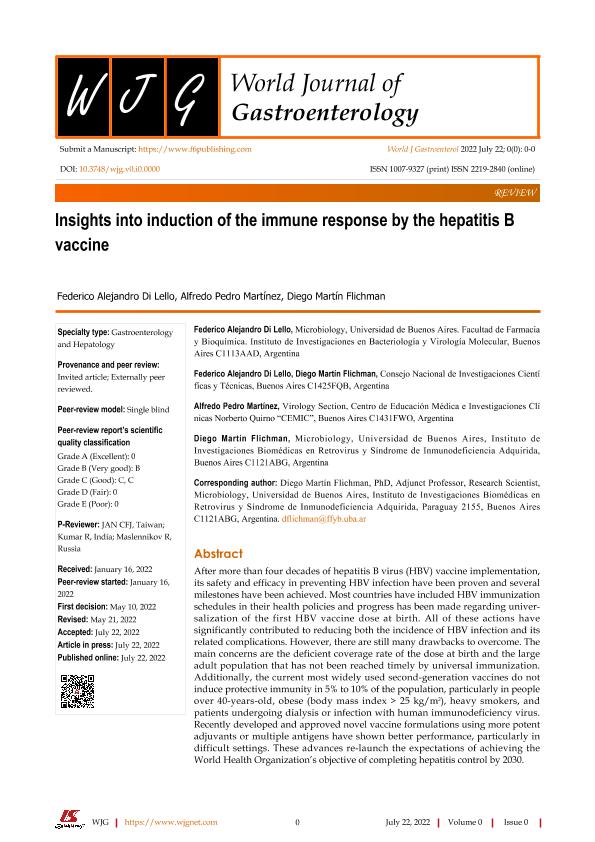Artículo
Insights into induction of the immune response by the hepatitis B vaccine
Fecha de publicación:
08/2022
Editorial:
W J G Press
Revista:
World Journal of Gastroenterology
ISSN:
1007-9327
e-ISSN:
2219-2840
Idioma:
Inglés
Tipo de recurso:
Artículo publicado
Clasificación temática:
Resumen
After more than four decades of hepatitis B virus (HBV) vaccine implementation, its safety and efficacy in preventing HBV infection have been proven and several milestones have been achieved. Most countries have included HBV immunization schedules in their health policies and progress has been made regarding universalization of the first HBV vaccine dose at birth. All of these actions have significantly contributed to reducing both the incidence of HBV infection and its related complications. However, there are still many drawbacks to overcome. The main concerns are the deficient coverage rate of the dose at birth and the large adult population that has not been reached timely by universal immunization. Additionally, the current most widely used second-generation vaccines do not induce protective immunity in 5% to 10% of the population, particularly in people over 40-years-old, obese (body mass index > 25 kg/m2), heavy smokers, and patients undergoing dialysis or infection with human immunodeficiency virus. Recently developed and approved novel vaccine formulations using more potent adjuvants or multiple antigens have shown better performance, particularly in difficult settings. These advances re-launch the expectations of achieving the World Health Organization’s objective of completing hepatitis control by 2030.
Palabras clave:
ANTIBODIES
,
HEPATITIS B VIRUS
,
IMMUNE RESPONSE
,
NEUTRALIZING
,
VACCINE
Archivos asociados
Licencia
Identificadores
Colecciones
Articulos(INBIRS)
Articulos de INSTITUTO DE INVESTIGACIONES BIOMEDICAS EN RETROVIRUS Y SIDA
Articulos de INSTITUTO DE INVESTIGACIONES BIOMEDICAS EN RETROVIRUS Y SIDA
Citación
Di Lello, Federico Alejandro; Martínez, Alfredo Pedro; Flichman, Diego Martin; Insights into induction of the immune response by the hepatitis B vaccine; W J G Press; World Journal of Gastroenterology; 28; 31; 8-2022; 4249-4262
Compartir
Altmétricas




